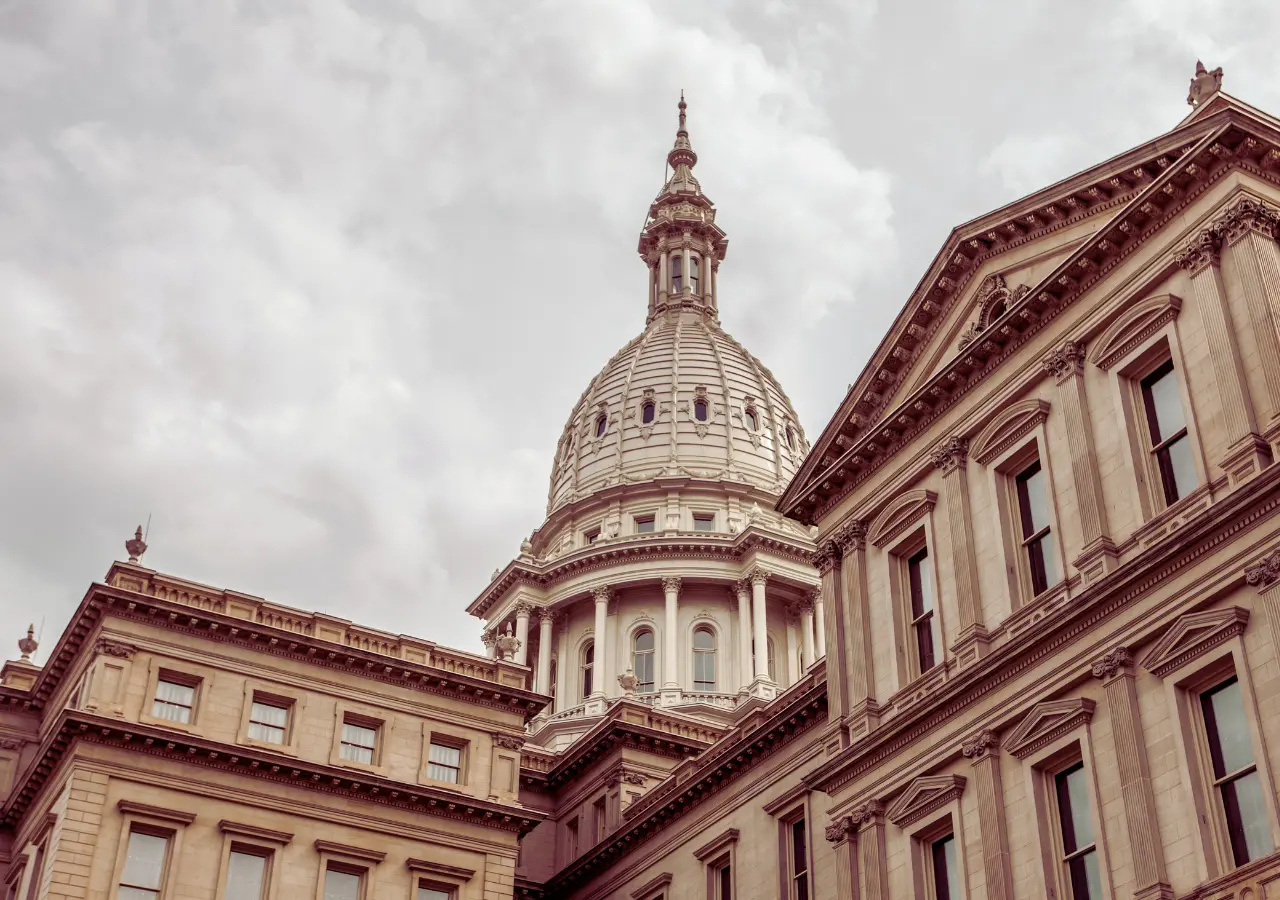
BY KATHERINE DAILEY AND KYLE DAVIDSON, MICHIGAN ADVANCE
MICHIGAN—The state Legislature delivered on promises to preserve free school meals and increased per pupil funding, after months of tough negotiations ended in lawmakers passing an eight-day budget extension to iron out the final details.
“Nothing is perfect, obviously, in a world where we have split government, but this is a good education budget that protects the vital programs Senate Democrats and the governor fought for and won in the last two years,” said Senate PreK-12 appropriations Subcommittee Chair Darrin Camilleri (D-Trenton), “the school breakfast and lunch program for all kids, the mental health and school safety dollars, especially to the the new increase that we got in this new budget, record per-pupil.”
Lawmakers worked into early Friday to finalize the $21.3 billion dollar budget deal, which passed the Senate by a vote of 31-5, with all of the votes against coming from Republicans, and passed the House by a vote of 104-5, with a mix of Democrats and Republicans voting against it.
In the Senate, Minority Leader Aric Nesbitt (R-Porter Township) and Sens. Thomas Albert (R-Lowell), Joseph Bellino (R-Monroe), Jonathan Lindsey (R-Coldwater) and Jim Runestad (R-White Lake) made up the nays.
In the House, from the GOP, state Reps. Steve Carra of Three Rivers, James DeSana of Carleton and Brad Paquette of Niles voted against SB 166. Democratic state Reps. Dylan Wegela of Garden City and Regina Weiss also voted no.
While both chambers held education funding as one of their top priorities, the Republican-led House and the Democratic-led Senate presented vastly different proposals on how to support K-12 schools, community colleges and universities, with Democrats and education advocates criticizing Republicans’ initial plan to collapse funding for several programs – including free school lunches – into one bucket.
Education funding broadly increased from last year by around $600 million, with K-12 school aid increasing the most by over $500 million. The budget increased per-pupil funding to $10,050, a record funding level per student.
That state aid to schools is now contingent, per a new line in the budget on compliance with programs including school meals and curriculum requirements.
State school lunch and breakfast programs remained funded at the same levels as last year, while the federal share for school lunch programs increased by $7 million.
There’s also an additional $1.6 million for universal school meals for nonpublic schools that participate in the federal school lunch program to join the state’s school meals program.
New one-time funding included $65 million allocated for small class sizes, specifically for grades K to 3, as well as an infrastructure grant of $100 million and community violence intervention grants of $10 million.
An additional $258 million for “at-risk” pupil support, as well as new reporting and accountability requirements for at-risk supports. That grant may also be used, up to 30%, to reduce class sizes.
At-risk funding, as well as funding for English language learner support, each increased by 25%—a change which Senate Democrats had pushed for but House Republicans had sought to eliminate from the budget.
The budget eliminated $100 million in district reimbursements for the Michigan Public School Employees’ Retirement System. Camilleri noted that this money was rolled into the foundation allowance, which provides for the per-pupil funding.
It also moved several programs, including mental health and school safety grants and career and technical education incentives from ongoing to one-time funding.
“That’s through deliberation and discussion to see where they better fit, and kind of trying to project out what’s going to happen in the future,” House Appropriations Committee Chair Ann Bollin (R-Brighton Township) told reporters after the Education Budget was approved in conference committee.
“You want to have programs that one, they’re producing results, and two, that you’re investing in areas that they have potential to help, right,” Bollin said. “And you need to kind of cut them sometimes, when they aren’t producing.”
Camilleri noted that mental health and school safety grants were previously funded through one-time funding, and that lawmakers have to fight for these programs every year.
“A lot of these items are going to be up for discussion and consideration again in the future budgets that we have,” Camilleri said. “I’m confident, though, that we now have set a bipartisan framework where we believe that these are the priorities that we all have come to an agreement on.”
The Fiscal Year 2026 Budget adds over $169 million in funding for per-pupil mental health and school safety grants. It also provides $70 million in one time funding to improve career and technical education in areas with limited programming.
While Bollin noted the education budget’s continued funding for literacy support, the allocations for this year’s budget is $17 million lower than in Fiscal Year 2025. The budget also zeroes out funding for early literacy district grants.
For higher education — university operations budgets increased by 2.8%, almost $48 million. Grants and financial aid for higher education, however, were cut by 4.2%, or nearly $23 million.
Community college operations budgets increased by 2.1%, and their total appropriations increased by 6.7%, totalling nearly $500 million.
Education advocates weigh in
Shortly after the education budget cleared the House, the K-12 Alliance of Michigan released a statement excoriating the Legislature for their monthslong delay in passing the budget.
“No lawmaker should be celebrating or expecting gratitude for a budget passed more than three months beyond their legal obligation to get it done and with zero transparency to allow it to be reviewed until shortly before it was passed,” said Robert McCann, the alliance’s executive director. “To be clear, Michigan’s schools have been harmed throughout every step of this unnecessary, Lansing-made crisis and the lack of accountability as lawmakers continued to obstruct a budget from moving forward will not be forgotten.”
While the alliance will be reviewing the budget and offering further comment in the coming days, McCann made one thing clear.
“Lansing owes our parents and schools an apology for this broken process.”
READ MORE: Michigan lawmakers bank on new marijuana tax to help fix state roads
This coverage was republished from Michigan Advance pursuant to a Creative Commons license.

About 72% of Michigan students considered not ‘college ready’
By Clara Lincolnhol, Capital News Service LANSING – Nearly three quarters of Michigan high school students are considered to be unprepared for...

Appeals court backs Michigan school in banning ‘Let’s Go Brandon’ shirts
SAND LAKE, Mich. (AP) — A federal appeals court on Tuesday ruled in favor of a Michigan school district in a dispute over free speech and "Let's Go...

Head Start moms won’t let Washington cut their kids’ future
While many of us were slapping on sunscreen and trying to soak up the last days of summer, moms across the country were dialing—and redialing—their...

MSU Extension union members say SNAP-Ed cuts will result in layoffs by end of July
BY BEN SOLIS, MICHIGAN ADVANCE MICHIGAN—The anticipated expiration of SNAP-Ed funding in October is likely to result in the permanent elimination of...

Teachers and school staff are on the chopping block in Cheboygan County thanks to the Trump administration
Up in the rural community of Wolverine, superintendent Matt Baughman is worried about how to keep his schools afloat if the Trump administration...




